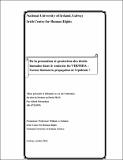| dc.description.abstract | The HIV/AIDS pandemic has reached historical heights. The number of infected people has been rising constantly and the HIV crisis has been spreading to more and more countries. Testimony to this is the higher number of infected people. Unless wide scale comprehensive preventive, care and treatment measures are taken, the epidemic will claim more and more lives. Its legal, social and economic impacts are numerous in the field of health, in education, agriculture, human resources, etc.
The rights of people who are infected are regularly violated. Those who live with the disease are victims of violence and they, consequently, bear the mark of a situation of acute precariousness. From the time the epidemic was discovered, people living with HIV/AIDS, face various levels of stigmatization and hidden discrimination which are tantamount to violence. They have faced exclusion in schools, in the work place and elsewhere.
Furthermore, people who are marginalized due to their HIV status eventually become the group that is most vulnerable and most exposed to risks of contamination by HIV. Women are a special target because they have faced several types of marginalization such as poverty, cultural status, high levels of illiteracy, a general low level of education, informal and irregular jobs, etc. Ignorance of the way transmission occurs sustains irrational fears of contamination, bringing about prejudices. Discrimination and stigmatization of people living with HIV/AIDS and their companions reduce the efficiency of programs aimed at prevention, treatment and care.
The purpose of the study is to show that fundamental human rights commit States to take legal and regulatory measures aimed at eliminating all forms of discrimination against people living with HIV/AIDS and other vulnerable groups, in order to safeguard all their fundamental liberties. According to the study, in order to respond to this call, it will be necessary to find, with the aid of core, efficient initiatives, responses which will be compatible with individual rights and public health initiatives. | en_US |
| dc.local.note | The link between HIV/AIDS and Human rights became obvious in the reality of the epidemic through the rise of the vulnerability of certain groups of people. HIV/AIDS is a problem in regards of human rights as certain groups of victims of human rights' violations like women, children, as well as those that live in poverty are incapable to achieve their fundamental rights. The stigma and discrimination that affect people living with the pandemic have an impact on access to efficient treatments, to employment, to health care, to education, to housing, as well as to other rights. The human rights' protection in the context of HIV/AIDS is not only an imperative of justice to surmount the existing forms of discrimination and intolerance. It is also an instrument to stop the continuous growth of the epidemic. | en_US |


